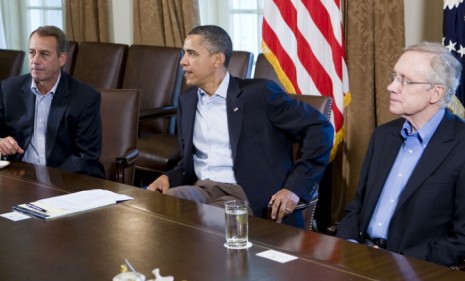4 ways Washington screwed up the debt fight
In The New York Review of Books, Elizabeth Drew excoriates America's lawmakers for risking America's AAA credit rating for partisan gain

A free daily email with the biggest news stories of the day – and the best features from TheWeek.com
You are now subscribed
Your newsletter sign-up was successful
The clock is ticking. And with barely a week left to raise the $14.3 debt ceiling before the government runs out of money to pay many of its bills on Aug. 2, Congress and President Obama remain at odds. "Someday," says Elizabeth Drew in The New York Review of Books, "people will look back and wonder, What were they thinking?" Why is Congress obsessed with slashing spending when most economic experts agree that "focusing on growth and jobs is more urgent in the near term..."? And how did raising the debt ceiling, a routine procedure in the past, become "ridiculously contorted," pushing America toward catastrophe? Here, as told in Drew's "extremely insightful and brilliant narrative," are four key factors:
1. President Obama has become a "pushover"...
From the beginning, Republicans insisted they "would use the need to raise the debt ceiling as an instrument for extracting concessions from the Democratic president in the form of more cuts in federal programs." Rather puzzlingly, Obama agreed, one of many cave-ins that "established in both Democrats' and Republicans' minds the thought that Obama was a weak negotiator — a 'pushover.'" Consequently, Democrats have become "increasingly sour, even disrespectful" to the president. And Republicans have taken full advantage. "They had lured the president so far onto their territory, that any deal would represent a substantial victory for them," Drew writes. "What a disaster," says Paul Krugman at The New York Times.
The Week
Escape your echo chamber. Get the facts behind the news, plus analysis from multiple perspectives.

Sign up for The Week's Free Newsletters
From our morning news briefing to a weekly Good News Newsletter, get the best of The Week delivered directly to your inbox.
From our morning news briefing to a weekly Good News Newsletter, get the best of The Week delivered directly to your inbox.
2. … Because all Obama cares about is getting re-elected
"It all goes back to the 'shellacking' Obama took in the 2010 elections," Drew says. "The president's political advisers studied the numbers and concluded that the voters wanted the government to spend less." Team Obama figured spendthrift, "middle-of-the-road independent voters" who don't "consider 'compromise" a dirty word" would decide the outcome in 2012, and has shaped its policies accordingly. Everything the president now does — like trying to craft a Grand Bargain by caving to GOP demands on spending — is fueled by his re-election strategy. "How much more must we lose for the president to win in 2012?" laments Bob Swern at Daily Kos.
3. Republicans are calamitously wedded to anti-tax dogma…
"The Republicans displayed a recklessness that should have disqualified them from being taken seriously," Drew says. They maintain, with "Alice in Wonderland logic," that even the elimination of a tax break is a tax increase, and they won't consider anything resembling a tax increase — even when offered a tradeoff of trillions in cuts by Obama. This GOP position is "strongly rooted in mythology" that incorrectly equates tax cuts and job creation, and makes Republicans largely responsible for this looming disaster.
A free daily email with the biggest news stories of the day – and the best features from TheWeek.com
4. … Because they're all afraid of the Tea Party
In 2010, the GOP kicked Bob Bennett to the curb in favor of Tea-Party candidate Mike Lee. A three-term senator from Utah with a strong conservative record, Bennett was jettisoned, strangely, for "having been insufficiently pure in his conservatism." The lesson: "If Bob Bennett could be dumped, no one was safe." The far-Right's anti-tax, anti-spending platform has become sacrosanct. And every House Republican has scurried to his or her right, fueling a GOP bargaining position so "obdurate" that the Republican Party has risked coming across "as putting its own ideology and own partisan interests ahead of the nation's needs."